New York Mennonite Immigration Program
Celebrating 20 years of serving immigrants in NYC
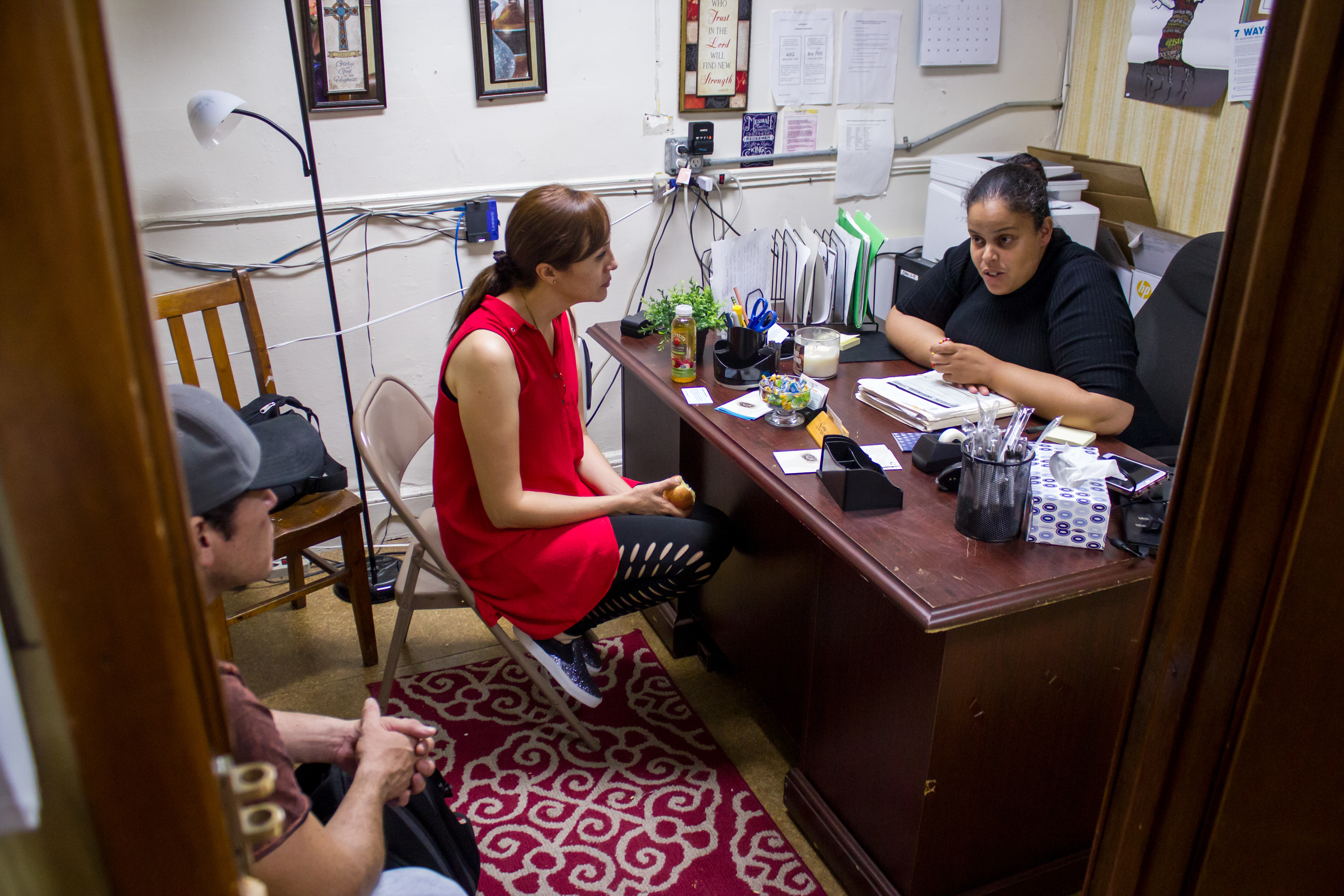
Maria Aponte leans across her desk, where a bowl of Jolly Rancher hard candies offer a simple sign of welcome to a woman and her husband that sit on the other side. At first glance, the meeting between Aponte and her clients, one of whom holds a half-eaten apple, may seem casual and insignificant. But for many immigrants who seek legal help from the New York Mennonite Immigration Program (NYMIP), a meeting like this is more than a casual chat. It’s a way forward.
Aponte, direct services immigration associate for Mennonite Central Committee (MCC) in Brooklyn, N.Y., intently listens to each client’s story. She then pieces together the maze-like puzzle forming a legal pathway that will give the individual or family the security to put down deep roots in their community, find employment and live with dignity in their new country.
This type of assistance to immigrants in New York City is possible thanks to the program, which began in 1998 and is the result of a partnership between MCC and the New York City Council of Mennonite Churches (NYCCMC). In October 2018, the program celebrated 20 years of assisting immigrants in the city as they work with local churches and organizations to address the complexity of immigration issues through legal consultation and representation, community outreach, advocacy, referrals and education. While immigration services are very expensive and include a daunting amount of required paperwork, much of the work of NYMIP is done at low or no cost to the individuals who seek legal assistance.
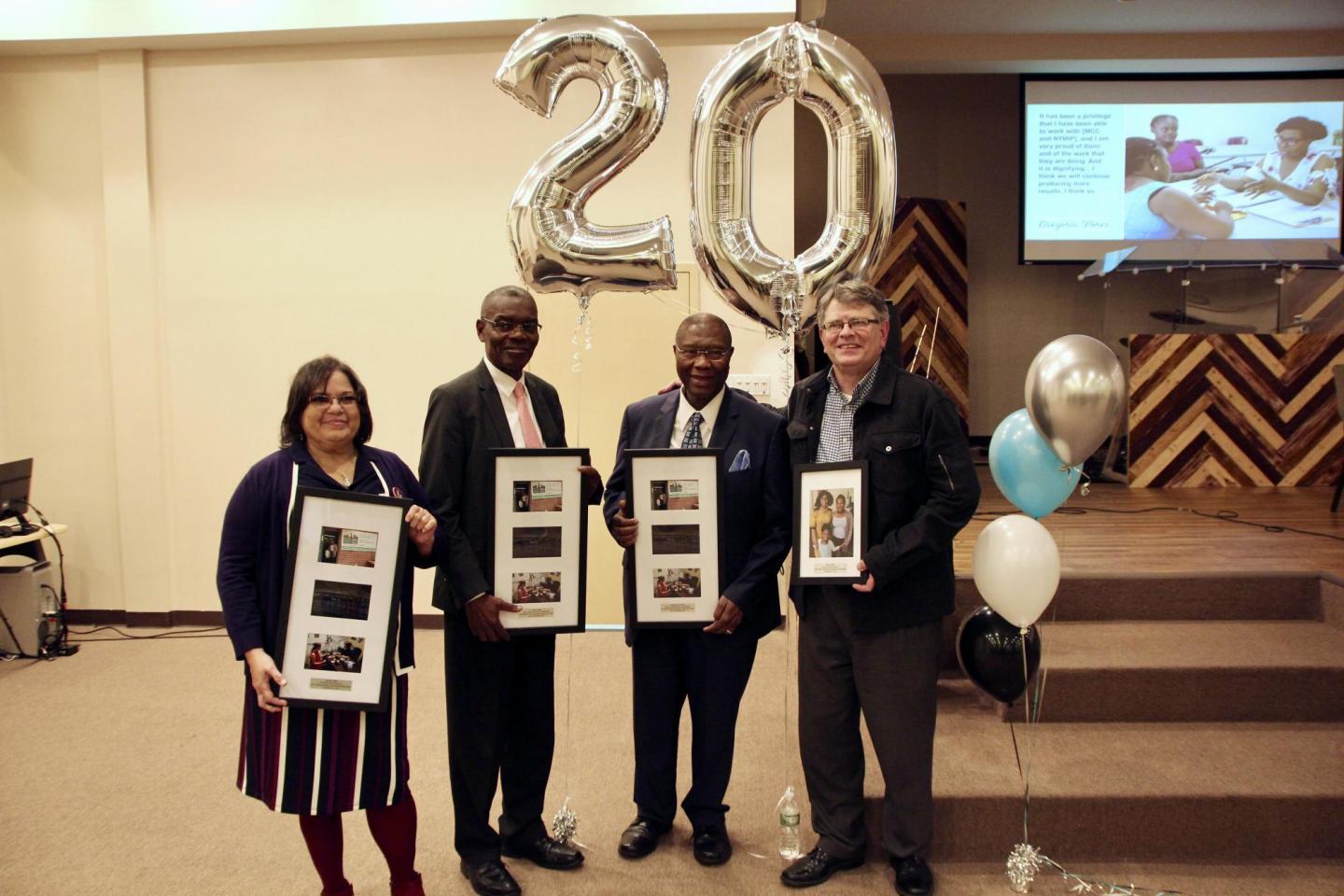
The current active members of NYMIP’s board of directors include Sandra Perez of Manhattan Mennonite Fellowship, board chair, Sylvia Shirk of Manhattan Mennonite Fellowship, secretary, Pastor Celso Jaime of Evangelical Garifuna Church in the Bronx, Curtis Book, peace and justice coordinator for MCC East Coast and member at large, Ken Bontrager of King of Glory Tabernacle and Liliana P.* of Manhattan Mennonite Fellowship. (*Last name not used for her security.)
The creation of NYMIP is attributed to the efforts of dedicated pastors and individuals who recognized a great need for immigration legal assistance in New York City’s Mennonite churches.
Nicolas Angustia, bishop of LMC (formerly known as Lancaster Mennonite Conference) churches in New York City, says, “Twenty years ago, the members of the church I was pastoring had a very serious problem, and it was that there were many undocumented people. They came to me, they confessed their pains, their fears.”
Pastor Celso Jaime of Evangelical Garifuna Church in the Bronx also played an instrumental role in the formation of NYMIP. He explains, “Everything that is invented comes from a need… And immigration services were one of the needs [in our churches]. People would come and say, ‘Pastor, what do I do about this?’ ‘How do I do my papers?’ And when somebody comes and asks you for help and you can’t give them the help, it’s very hard. We began to talk and meet up and see what we could do. And from there is where this program began.”
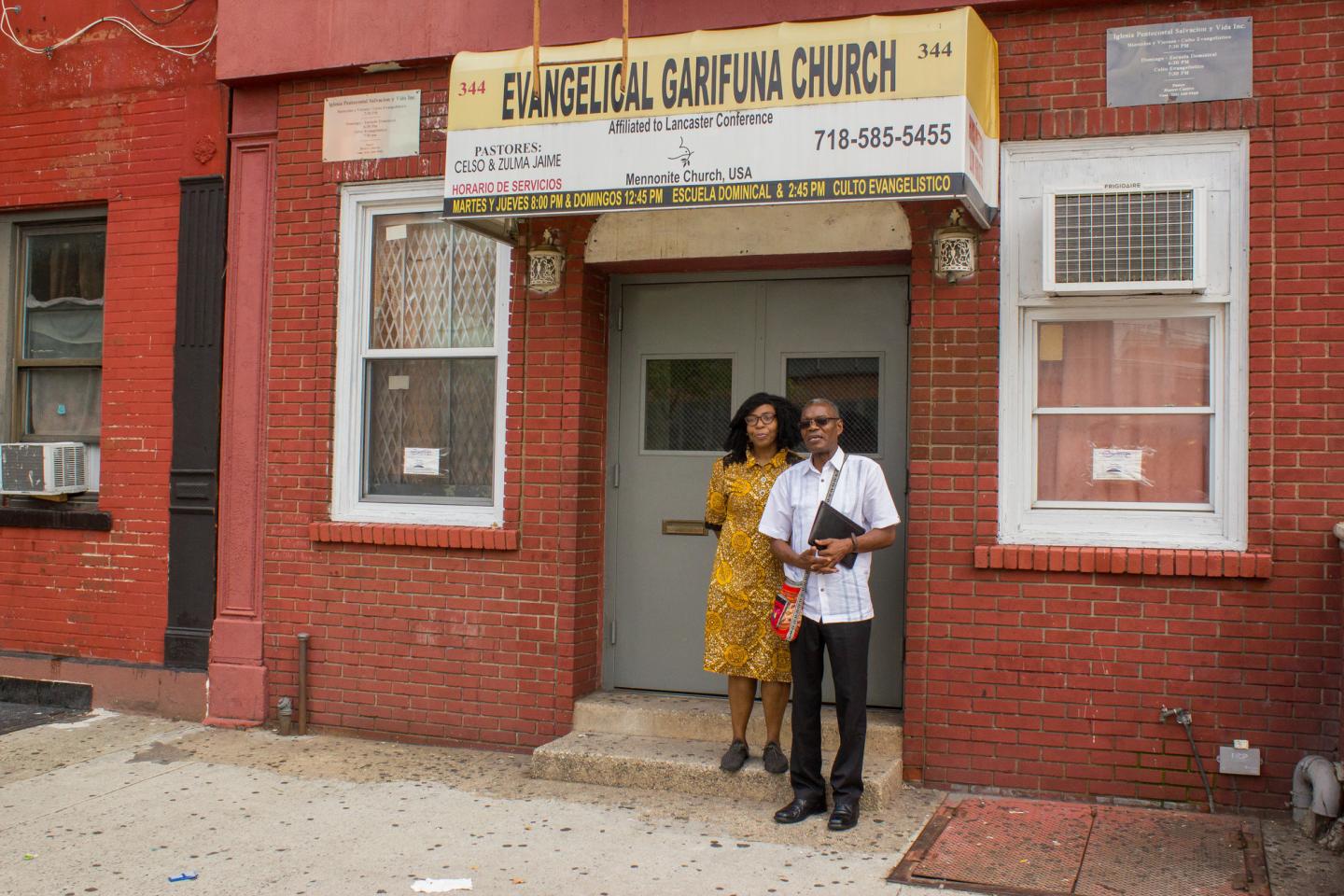
According to Bishop Angustia, the executive director of MCC’s East Coast region at that time, Lynn Roth, expressed interest in creating an immigration office to respond to undocumented individuals’ needs in Hispanic churches throughout New York City. MCC and New York City pastors collaborated with Lutheran Social Services, a faith-based non-profit organization based in the city whose services at that time included immigration legal and case management services. Together, these individuals and organizations formed the committee which gave direction to the immigration office.
Bishop Angustia called upon Sandra Perez, who was then a member of United Revival Mennonite Church (URMC) in Brooklyn, to use her community organizing experience to get an immigration program started using office space at URMC. After two months of training as an immigration paralegal, Perez says, “I began seeing clients immediately.” Twenty years later, Perez says of the immigration program, “I am proud that what started as a spark of hope and love is turning into a beacon of light shining across New York City.”
Angustia reflects, “What I want to highlight is that God helped us by touching the heart of Lynn [Roth] and MCC, for their participation was central and definitive… I believe that definitely God helped through MCC’s strong response to find employees here, start the office and help so many people… Brothers and sisters that didn’t have the possibility of paying the MCC immigration office could be helped at the cost of practically nothing.”
Twenty years later, NYMIP continues to be a valuable resource for immigrants in New York City. Perez says, “I feel that God has continued to bless this program and am proud that after twenty years the program has grown and thrived.”
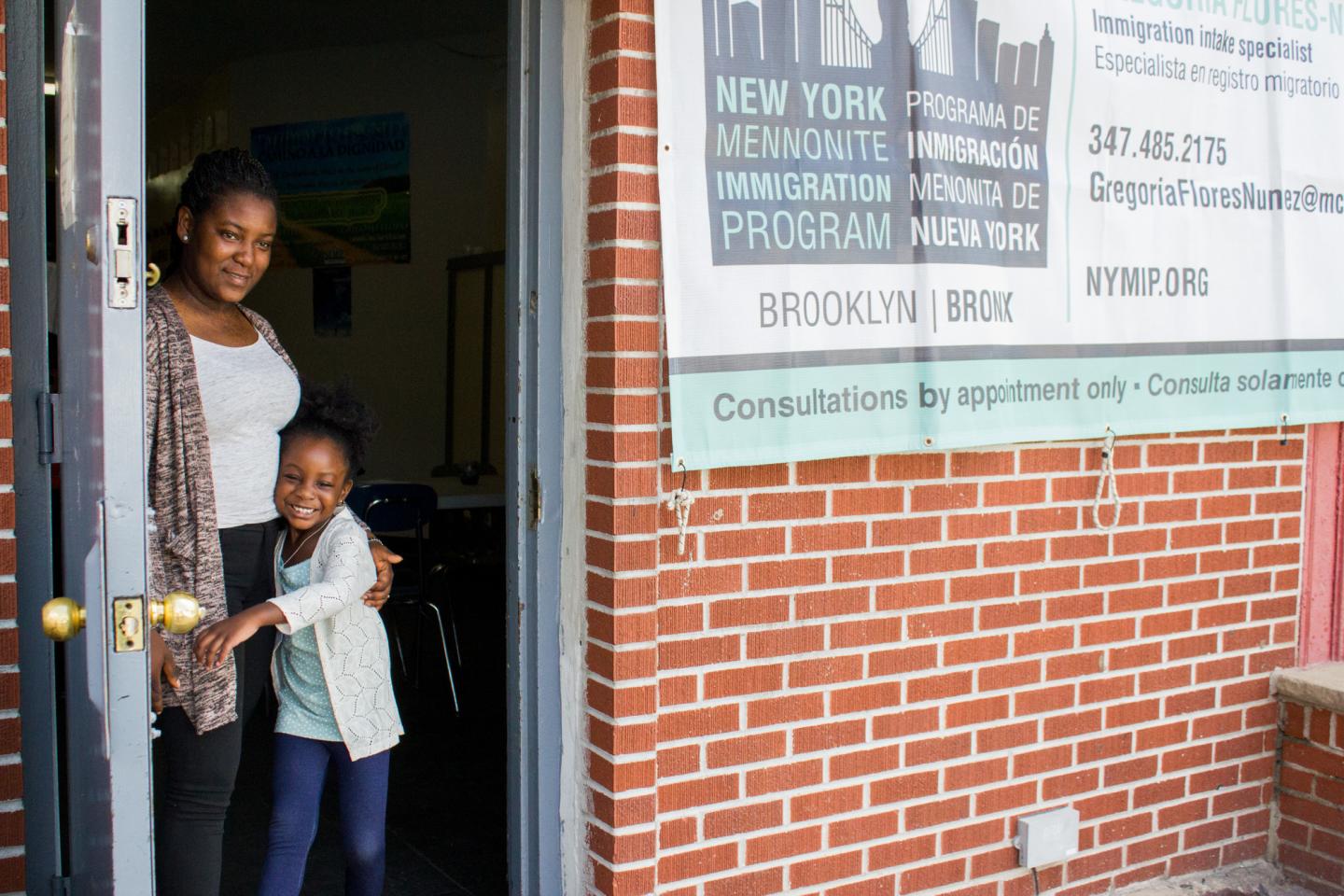
Angie Batiz and her daughter Angelie came to the U.S. from Honduras four years ago when circumstances at home became very difficult. Batiz says, “…Things over there [were] not good and we [were] not eating enough on time, and also the violence was terrible over there.” The last straw that provided her with the strength to decide to come to the U.S. was when she saw her uncle’s wife killed in their home. She says, “The violence was increasing, and I knew that if I stayed there, me or somebody else in my house… would die. And I decided to leave with my daughter.” Now that Angie is in the U.S., NYMIP has helped Batiz and her daughter obtain their legal permanent residency. Having this legal status has allowed Batiz to graduate from high school in New York City, be able to express herself well in English and continue her studies to become a doctor.
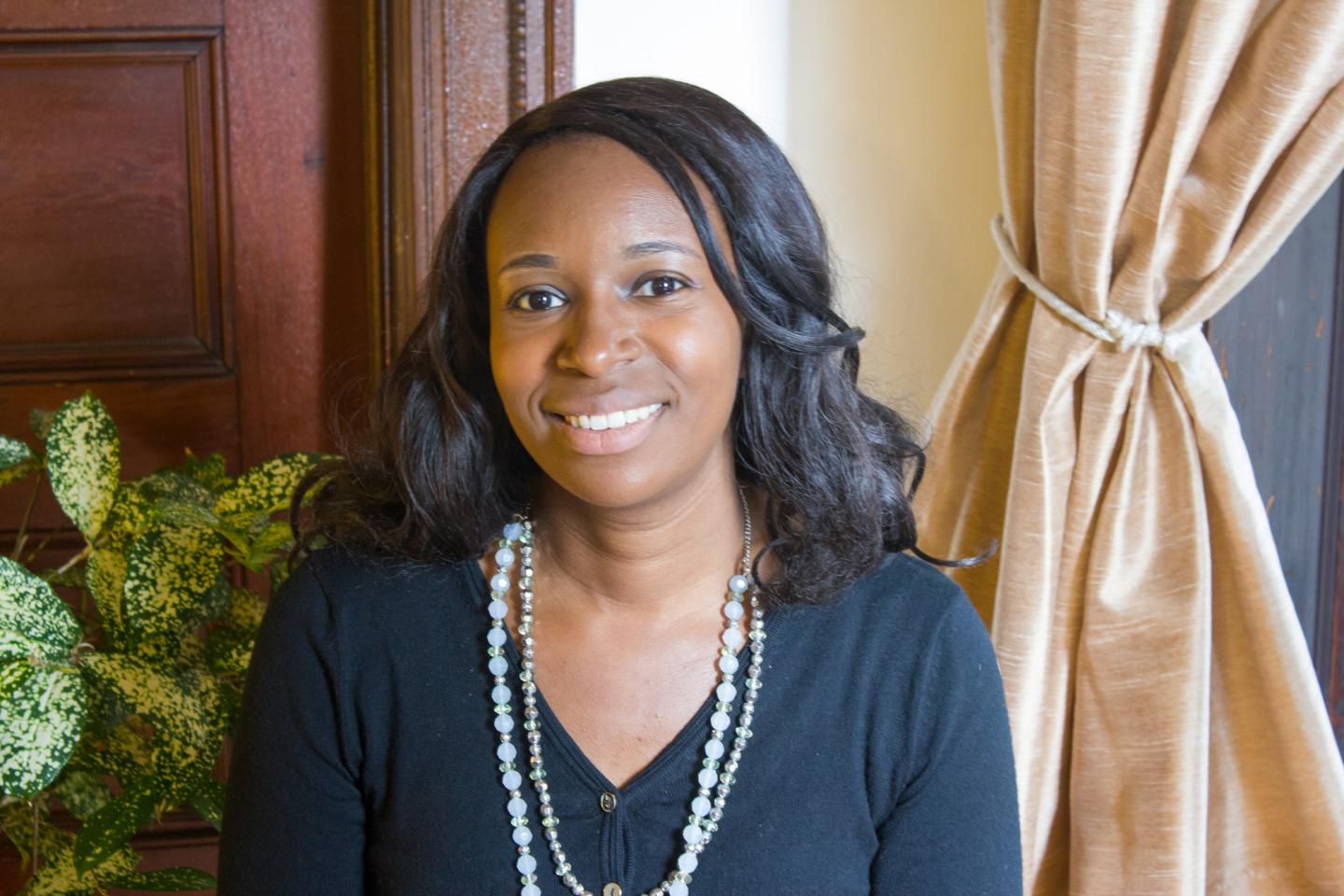
Marilyn Pierre is the executive director of the Haitian Family Resource Center (HFRC) in Brooklyn, N.Y. Pierre says, “We came to know NYMIP after the earthquake that happened in Haiti in 2010. And since then, we have partnered with them in working with the needs of the people and the needs of the community.” Since the 2010 earthquake pushed many Haitians to make the difficult choice to leave their home communities, HFRC worked alongside the Haitian immigrant community in New York City, addressing their needs in terms of legal assistance, helping family members contact one another, providing translation services, hosting clothing drives and giving food resources. Sylvia Shirk, who serves on the NYMIP board of directors and is a former pastor of Manhattan Mennonite Fellowship, was contracted by MCC during that time to assist the community, using her Haitian Creole language skills to support many individuals and families. Through the HFRC, families trusted NYMIP to help them apply for Temporary Protected Status (TPS), pay their taxes and send their children to school. (TPS gives individuals a legal pathway to be able to work, go to school, and pursue other opportunities in their new country.) Pierre continues, “There’s no words to describe the impact that they [NYMIP] did in the lives of these families… [People] came to the center and met with NYMIP, they sat down with us and explained to us what their situation was. We saw families coming, crying, thanking us because they were reunited with their families…they felt that they were now safe. Because this program gave them hope.”
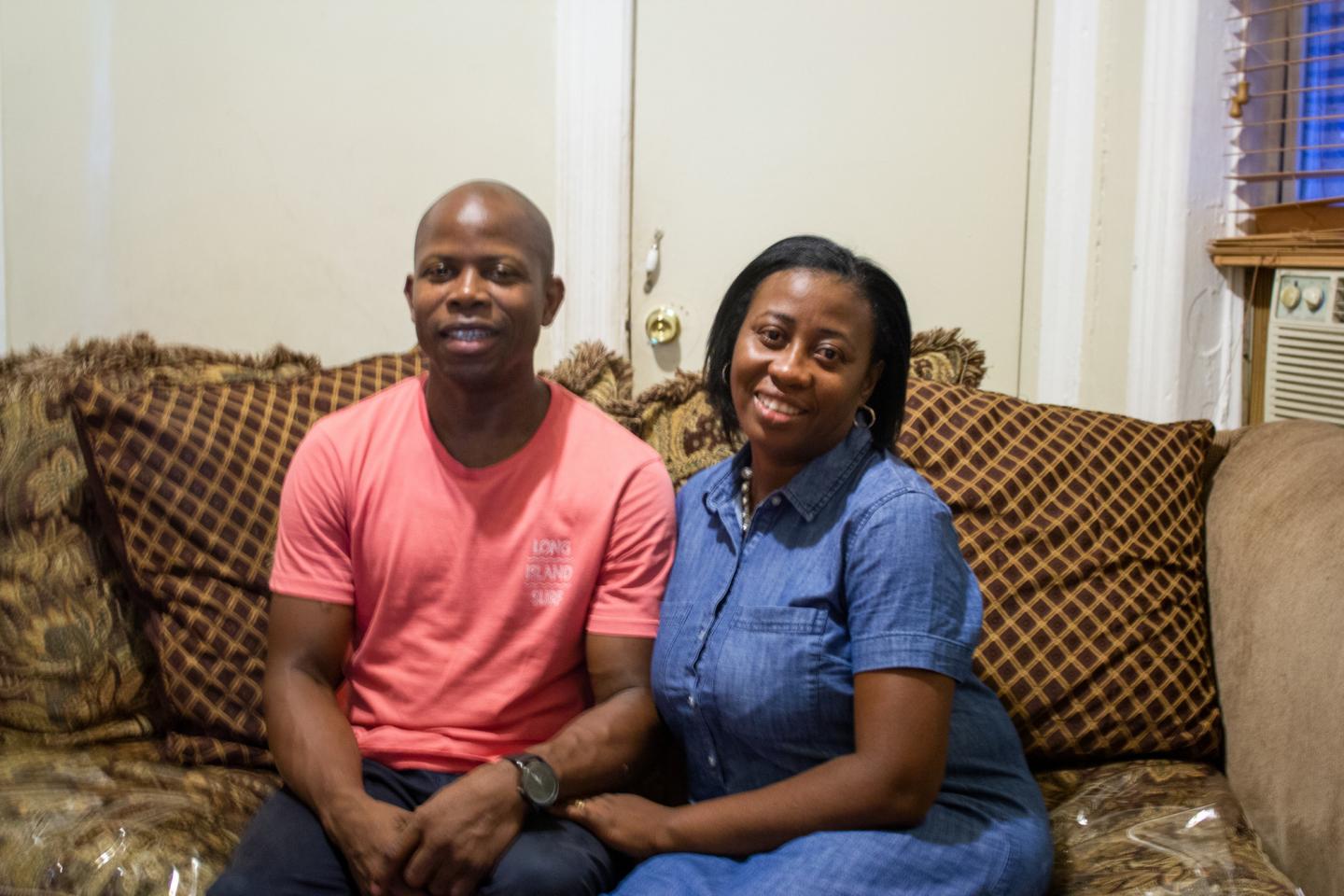
Martín Alvarez came to the U.S. from Honduras on Christmas Day of 1999 to reunite with his mother. In Martín’s words, “I came with the desire to seek a better life.” But in doing so, he made the difficult decision to leave behind his wife and children and risk being undocumented in the U.S. When he arrived, he says, “I realized that there’s a reality that was different than what I thought of the U.S. When a person is here without their legal documents, it’s different, and a person suffers a lot.” Through Mennonite pastors in New York City, Martín was put in contact with Sandra Perez, who helped him find legal assistance so that he could avoid deportation and obtain legal residency so that he could bring his wife and children to be with him in the U.S. Of NYMIP he says, “The lawyers did an excellent job. I thank God for them, for the work they continue doing practically free for immigrants. It helped us very much, because now I have my permanent residency, and so do my wife and children who arrived here with us… Now we are together as a family, reunited.” He continues, “I can say that without the help of these [NYMIP] lawyers, I don’t know what I would have done. Maybe I would have been in Honduras still, or maybe I would be here, undocumented.” Now, Martín is proud to have been an ordained pastor for five years at Evangelical Garifuna Church of Brooklyn and is extending his ministry to include missions work in his home country of Honduras.
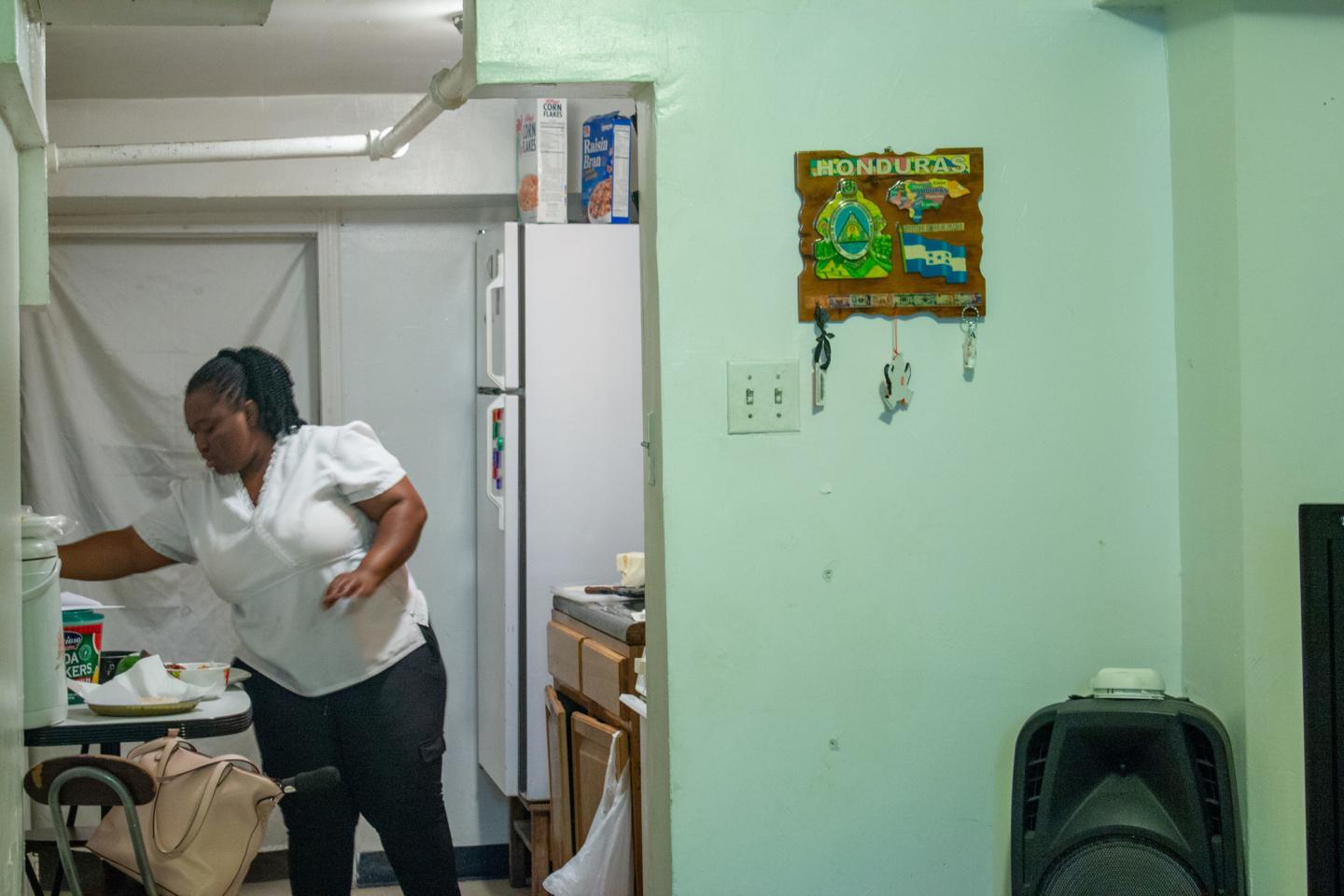
Dayri Sambula came to the U.S. from Honduras when she was 25 years old because she was receiving death threats and was a victim of political persecution. She feared for her life, so she made the difficult decision to leave her home and job as a nurse along with son, Silmer, who was 4 years old at the time. She says, “The journey, thank God, was not very difficult. God put people in my path and we went from bus to bus… If I tell you about the process of traveling [to the U.S.], the only thing I wanted was to safeguard my life and safeguard my son’s life.” After an 8-day journey to the U.S., Dayri and Silmer arrived in New York City. The process of applying for political asylum included four years of countless immigration appointments and court appearances, and Dayri found valuable legal assistance at Garifuna Community Services, a faith-based community center located in the Bronx which is one location where NYMIP serves clients. Dayri says, “Thanks to Garifuna Community Services, because if it were not for [them], I might have sought help where I didn’t need to. They were the ones who were right by my side day and night… They were the ones who helped me take this path and get to where I am, and we are also hoping for citizenship when the time comes.” In addition to illuminating a legal pathway for Dayri and Silmer, Garifuna Community Services and NYMIP gave them basic necessities during their first days in the U.S. as part of a greater response to the influx of unaccompanied minors and women seeking asylum. Dayri says, “Garifuna Community Services many times gave us gift cards to buy underwear, to buy clothes for the kids, to give the kids a coat, because we came during the winter… That’s how we were able to get started in this country.” Now Dayri and her son have their residency papers and, with her work permit, Dayri is working as a home health aide and is hoping to further her studies in nursing. Silmer, who is now 9 years old, is excelling in his math and science classes at school.
In New York City, Miami and other places around the U.S., MCC works with Anabaptist churches to provide direct services, education and advocacy related to immigration. Counselors meet with clients by appointment only. Please contact our offices to schedule an appointment.
Miami
Jorge Vielman, Florida program coordinator for MCC East Coast
JorgeVielman@mcc.org
(305) 249-3477
New York City
Maria Aponte, direct services immigration associate for MCC East Coast
MariaAponte@mcc.org
(347) 608-1925
For more information on MCC’s immigration work, visit our migration and refugee page.

